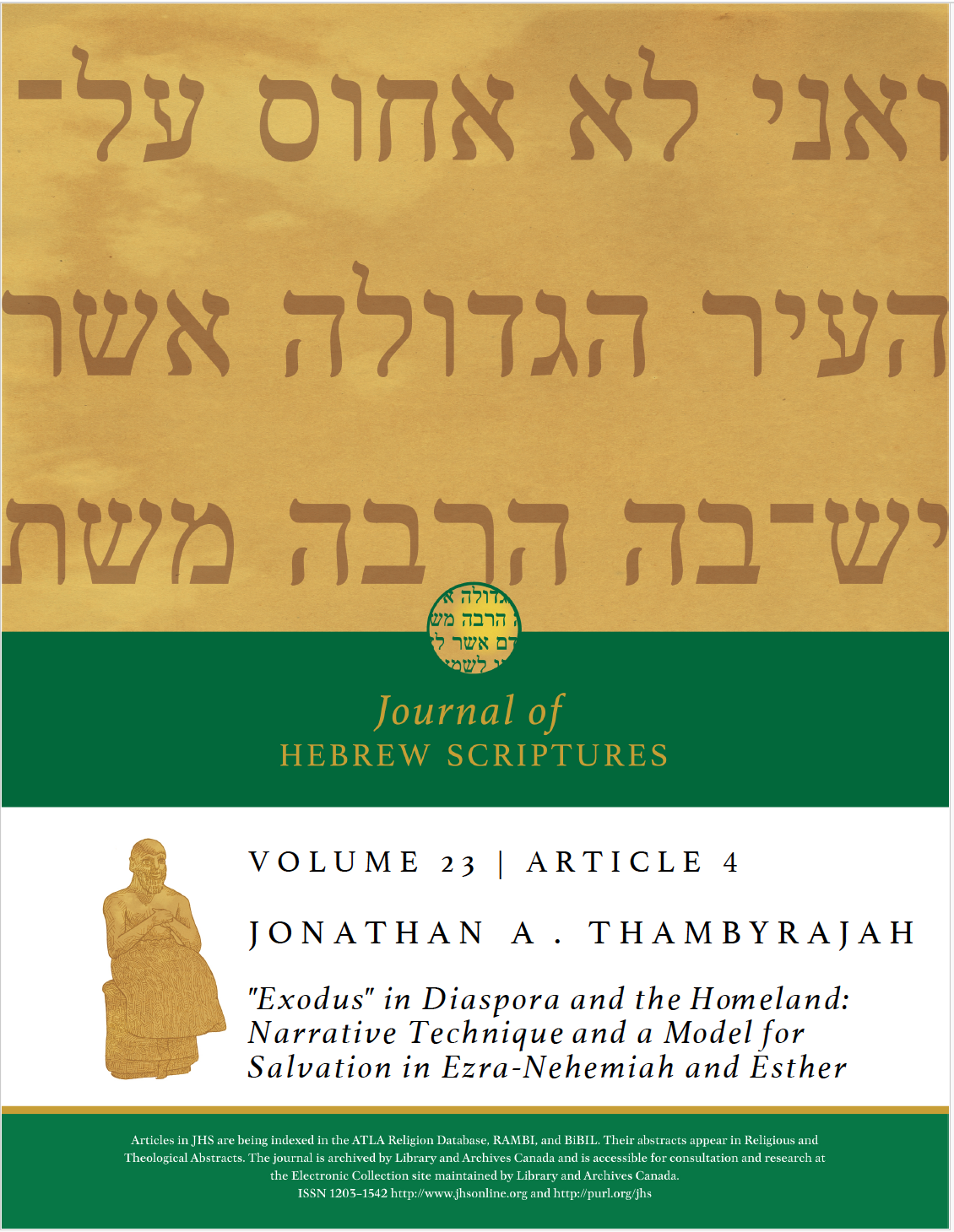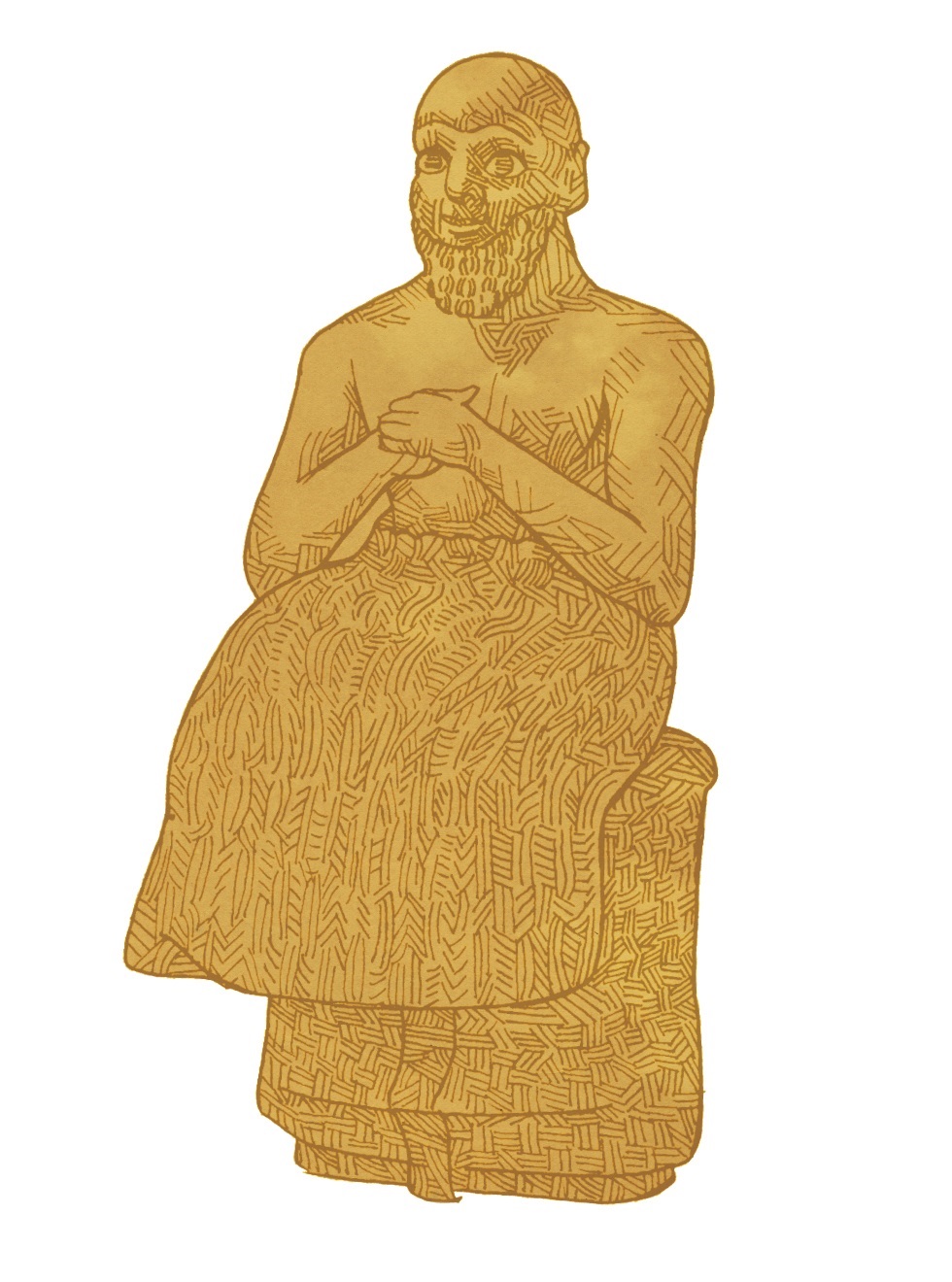“Exodus” in Diaspora and the Homeland: Narrative Technique and a Model for Salvation in Ezra-Nehemiah and Esther
DOI:
https://doi.org/10.5508/jhs29611Keywords:
Esther, Ezra-Nehemiah, Narrative, DiasporaAbstract
Scholarship has been divided on whether there is any reference to the exodus in the books of Ezra-Nehemiah and Esther. In this article, it is argued that although both books do refer to the exodus, they do not necessarily refer to the book of Exodus. Rather than approaching this problem from the perspective of intertextuality, the article studies the use of exodus motifs as a narratological phenomenon. It compares the way that two texts, one from the diaspora and one from Yehud, use exodus motifs to support their own agendas. In each text, the exodus acts as a model for a type of salvation.
References
Alter, Robert. The Art of Biblical Narrative. New York: Basic Books, 1981.
Andrew, M.E. “Esther, Exodus and Peoples.” ABR 23 (1975): 25–28.
Ashley, Timothy R. The Book of Numbers. NICOT. Grand Rapids: Eerdmans, 1993.
Bal, Mieke. Narratology: Introduction to the Theory of Narrative. 4th ed. Toronto: University of Toronto Press, 2017.
Becker, Uwe. Exegese des Alten Testaments: ein Methoden- und Arbeitsbuch. 5th ed. Tübingen: Mohr Siebeck, 2021.
Becking, Bob. “Does Ezra Present the Return from Exile as a Second Exodus?” BN 117 (2018): 65–73.
Becking, Bob. Identity in Persian Egypt: The Fate of the Yehudite Community of Elephantine. University Park: Eisenbrauns, 2020.
Bellman, Simon. Politische Theologie im frühen Judentum: eine Analyse der fünf Versionen des Estherbuches. BZAW 525. Berlin: de Gruyter, 2020.
Ben Porat, Ziva. “The Poetics of Allusion.” PhD diss., University of California, Berkeley, 1973.
Ben Porat, Ziva. “The Poetics of Allusion—A Text Linking Device—In Different Media of Communication.” Pages 588–93 in A Semiotic Landscape. Panorama sémiotique: Proceedings of the First Congress of the International Association for Semiotic Studies, Milan June 1974 / Actes du premier congrès de l'association Internationale de Sémiotique, Milan juin 1974. Edited by Seymour Chatman, Umberto Eco and Jean M. Klinkenberg. Berlin: de Gruyter, 2019.
Berg, Sandra. The Book of Esther: Motifs, Themes, and Structure. Missoula: Scholars Press, 1979.
Berger, Yitzhak. “Esther and Benjaminite Royalty: A Study in Inner-Biblical Allusion.” JBL 129 (2010): 625–44.
Berlin, Adele. Esther. JPS. Philadelphia: JPS, 2001.
Bickerman, Elias. “The Colophon of the Greek Book of Esther.” JBL 63 (1964): 339–62.
Blenkinsopp, Joseph. Ezra-Nehemiah. OTL. Philadelphia: Westminster Press, 1988.
Bush, Frederic. Ruth, Esther. WBC 9. Nashville: Thomas Nelson, 1996.
Byun, Paul. “The Persian Emperor’s New Clothes: a Literary Study of Imperial Representation in Ezra-Nehemiah.” PhD diss., Sydney University, 2020.
Carlson Hasler, Laura. Archival Historiography in Jewish Antiquity. Oxford: Oxford University Press, 2020.
Chan, Michael. The Wealth of Nations: a Tradition-Historical Study. Tübingen: Mohr Siebeck, 2017.
Clines, David. The Esther Scroll: The Story of the Story. Sheffield: A&C Black, 1984.
Clines, David. Ezra, Nehemiah, Esther. NCBC. Grand Rapids: Eerdmans, 1984.
Cohen, Abraham. “‘Hu Ha-goral’: The Religious Significance of Esther.” Judaism 23 (1974): 87–94.
Collins, John. The Invention of Judaism: Torah and Jewish Identity from Deuteronomy to Paul. Oakland: University of California Press, 2017.
Collins, N. “Did Esther Fast on the 15th Nisan? An Extended Comment on Esther 3:12.” RB 100 (1993): 533–61.
Copland, Sarah and James Phelan. “The Ideal Narratee and the Rhetorical Model of Audiences.” Poetics Today 43 (2022): 1–26.
Cunningham, Marshall. “Re-Constructing Judeanness: Homeland, Diaspora, and the Construction of Judean Identity in the 6th and 5th Centuries ʙᴄᴇ.” PhD diss., University of Chicago, 2020.
Davies, Gordon. Ezra and Nehemiah. Berit Olam. Collegeville: Liturgical, 1999.
Ego, Beate. Ester. BKAT 21. Göttingen: Vandenhoeck & Ruprecht, 2017.
Eskenazi, Tamara. “The Structure of Ezra-Nehemiah and the Integrity of the Book.” JBL 107 (1988): 641–56.
Eskenazi, Tamara. “The Political Theology of Ezra-Nehemiah.” Pages 242–56 in Political Theologies in the Hebrew Bible. Edited by Mark Brett and Rachelle Gilmour. Leiden: Brill, 2023.
Fensham, F. Charles. The Books of Ezra and Nehemiah. NICOT. Grand Rapids: Eerdmans, 1982.
Fewell, Danna. Reading Between Texts: Intertextuality and the Hebrew Bible. Louisville: Westminster John Knox, 1992.
Firth, David. “The Book of Esther: a Neglected Paradigm for Dealing With the State.” OTE 10 (1997): 18–26.
Firth, David. “When Samuel Met Esther: Narrative Focalisation, Intertextuality, and Theology.” STR 1 (2010): 15–28.
Fitzpatrick-McKinley, Ann. Empire, Power, and Indigenous Elites. JSJSup 169. Leiden: Brill, 2015.
Fludernik, Monika. “Conversational Narration—Oral Narration.” Pages 93–104 in vol. 2 of Handbook of Narratology. Edited by Peter Hühn et al. Berlin: de Gruyter, 2014.
Fox, Michael. Character and Ideology in the Book of Esther. 2nd ed. Eugene: Wipf and Stock, 2001.
Fried, Lisbeth S., ed. Was 1 Esdras First? An Investigation into the Priority and Nature of 1 Esdras. AIL 7. Atlanta: SBL Press, 2011.
Fried, Lisbeth S. Ezra: a Commentary. Critical Commentaries. Sheffield: Sheffield Phoenix, 2015.
Gerleman, Gillis. Esther. BKAT 21. Neukirchen-Fluyn: Neukirchener Verlag, 1973.
Gilmour, Rachelle. “Overturning Sovereignty: Esther in Dialogue with the Book of Samuel.” Paper presented at SBL San Diego 2019.
Goswell, Greg. “Keeping God out of the Book of Esther.” EQ 82 (2010): 99–110.
Grohmann, Marianne and Hyun Chul Paul Kim, eds. Second Wave Intertextuality and the Hebrew Bible. Atlanta: SBL, 2019.
Grossman, Jonathan. “‘Dynamic Analogies’ in the Book of Esther.” VT 59 (2009): 394–414.
Grossman, Jonathan. Esther: The Outer Narrative and the Hidden Reading. Siphrut 6. Winona Lake: Eisenbrauns, 2011.
Holt, Else. Narrative and Other Readings in the Book of Esther. LHBOTS 712. London: T&T Clark, 2021.
Hornung, Gabriel. “The Nature and Import of the Relationship between the Joseph Story in Genesis and the Book of Esther.” PhD diss., Harvard University, 2016.
Klingler, David. Validity in the Identification and Interpretation of a Literary Allusion in the Hebrew Bible. Eugene: Pickwick, 2021.
Knight, Douglas. Rediscovering the Traditions of Israel. Studies in Biblical Literature. 3rd ed. Atlanta: SBL Press, 2006.
Knowles, Melody. “Pilgrimage Imagery in the Returns in Ezra.” JBL 123 (2004): 57–74.
Koch, Klaus. “Ezra and the Origins of Judaism.” JSS 19 (1974): 173–97.
Koller, Aaron. Esther in Ancient Jewish Thought. Cambridge: Cambridge University Press, 2014.
Laird, Donna. Negotiating Power in Ezra Nehemiah. AIL 26. Atlanta: SBL Press, 2016.
Laniak, Timothy. “Esther’s Volkcentrism and the Reframing of Post-Exilic Judaism.” Pages 77–90 in The Book of Esther in Modern Research. Edited by Sidnie White Crawford and Leonard Greenspoon. JSOTSup 380. London: T&T Clark, 2003.
Levenson, Jon. Esther: A Commentary. OTL. Louisville: Westminster John Knox, 1997.
Leuchter, Mark. “Ezraʼs Mission and the Levites of Casiphia.” Pages 173–96 in Community Identity and Judean Historiography. Edited by Gary Knoppers and Kenneth Ristau. Winona Lake: Eisenbrauns, 2009.
Loader, James. “Esther as a Novel with Different Levels of Meaning.” ZAW 90 (1978): 417–21.
Loader, James. “Das Buch Ester.” Pages 199–280 in Hans-Peter Müller, Otto Kaiser, James Loader, Das Hohelied; Klagelieder; Das Buch Ester. ATD 16/2. Göttingen: Vandenhoeck & Ruprecht, 1992.
Macchi, Jean-Daniel. Esther. IECOT. Stuttgart: Kohlhammer, 2018.
Mason, Steve. “Jews, Judaeans, Judaizing, Judaism: Problems of Categorization in Ancient History.” JSJ 38 (2007): 457–512.
Miller, Geoffrey. “Intertextuality in Old Testament Research.” CurBR 9 (2010): 283–309.
Miller II, Robert D. “The Performance of Oral Tradition in Ancient Israel.” Pages 175–96 in Contextualizing Israel's Sacred Writings: Ancient Literacy, Orality, and Literary Production. Edited by Brian Schmidt. Atlanta: SBL Press, 2015.
Moffat, Donald. Ezra's Social Drama: Identity Formation, Marriage and Social Conflict in Ezra 9 and 10. LHBOTS. London: T&T Clark, 2013.
Moore, Carey. Esther. AB 7B. New Haven: Yale University Press, 1971.
Moore, Carey. “Esther Revisited Again: A Further Examination of Certain Esther Studies of the Past Ten Years.” Hebrew Annual Review 7 (1983): 169–87.
Najman, Hindy. “Traditionary Processes and Textual Unity in 4 Ezra.” Pages 99–119 in Fourth Ezra and Second Baruch. Edited by Matthias Henze and Gabriele Boccaccini with Jason Zurawski. Leiden: Brill, 2013.
Niesełowski-Spano, Łukasz. “The History of Passover: Changes in the Religion and Cult of the Judeans in 7th–5th Centuries BCE.” RB 127 (2020): 338–51.
Pagán, Samuel. Esdras, Nehemías y Ester. Comentario Bíblico Hispanoamericano. Miami: Caribe, 1992.
Pajunen, Mika. “Exodus in the Dead Sea Scrolls.” Pages 137–61 in The Reception of Exodus Motifs in Jewish and Christian Literature: “Let My People Go!” Edited by Beate Kowalski and Susan Docherty. Themes in Biblical Narrative 30. Leiden: Brill, 2022.
Phelan, James. “‘Self-Help’ for narratee and narrative audience: how ‘I’ - and ‘You’? - read ‘How.’ (Lorrie Moore's short story ‘How’ from the collection ‘Self-Help’) (Second-Person Narrative).” Style 28 (1994): 350–65.
Piani, Roberto. “The return from the exile in Ezra-Nehemiah: a second exodus, a re-conquest or a reestablishment of the status quo ante?” Paper presented at the International SBL Meeting in Amsterdam 2012.
Plett, Heinrich. “Intertextualities.” Pages 3–29 in Intertextuality. Edited by Heinrich Plett. Research in Text Theory 15. Berlin: de Gruyter, 1991.
Porten, Bezalel. “Aramaic Texts.” Pages 74–276 in The Elephantine Papyri in English: Three Millennia of Cross-Cultural Continuity and Change. By Bezalel Porten with J. Joel Farber et al. Leiden: Brill, 1996.
Propp, William. Exodus 19–40. AB 2. New York: Doubleday, 2006.
Prosic, Tamara. “Origin of Passover.” SJOT 13 (1999): 78–94.
Rosenthal, Ludwig. “Die Josephgeschichte, mit den Büchern Ester und Daniel verglichen.” ZAW 15 (1895): 278–84.
Scheffel, Michael. “Narrative Constitution.” In The Living Handbook of Narratology. Edited by P. Hühn et al. Hamburg: Hamburg University, 2013. http://www.lhn.uni-hamburg.de/article/narrative-constitution.
Schmid, Wolfgang. Elemente der Narratologie. 3rd ed. Berlin: de Gruyter, 2014.
Schmitt, Rainer. Exodus und Passa: ihr Zusammenhang im Alten Testament. OBO 7. Göttingen: Vandenhoeck & Ruprecht, 1982.
Segal, Judah. The Hebrew Passover: From the Earliest Times to A.D. 70. London: Oxford University Press, 1963.
Siquans, Agnethe. “Reception of Exodus in the Book of Judith.” Pages 56–73 in The Reception of Exodus Motifs in Jewish and Christian Literature: “Let My People Go!” Edited by Beate Kowalski and Susan Docherty. Themes in Biblical Narrative 30. Leiden: Brill, 2022.
Smith, Mark, and Elizabeth Bloch-Smith. The Pilgrimage Pattern in Exodus. JSOTSup 239. Sheffield: Sheffield Academic, 1997.
Steck, Odil. Old Testament Exegesis: A Guide to the Methodology. Translated by James Nogalski. 2nd ed. Atlanta: SBL Press, 1998.
Sternberg, Meir. The Poetics of Biblical Narrative: Ideological Literature and the Drama of Reading. Indiana Literary Biblical Series. Bloomington: Indiana University Press, 1985.
Talmon, Shemaryahu. “‘Wisdom’ in the Book of Esther.” VT 13 (1963): 419–55.
Tanner, Beth LaNeel. The Book of Psalms Through the Lens of Intertextuality. New York: Lang, 2001.
Thambyrajah, Jonathan. “The Rhetoric of Memucan's Speech: Genre and Characterisation in Esther 1.” ABR 67 (2019): 60–68.
Thambyrajah, Jonathan. “Jews in Susa—The Significance of Setting in the Book of Esther.” ABR 69 (2021): 23–36.
Thambyrajah, Jonathan. “‘Other Laws’: Haman’s Accusation against the Jews in the Book of Esther.” JSOT 47 (2022): 43–55.
Thambyrajah, Jonathan. “The Narrative Motif of Anger and Esther’s Ethics of Diaspora.” ABR (forthcoming).
Throntveit, Mark. Ezra-Nehemiah. Int. Louisville: John Knox, 1992.
Tomasino, Anthony. Esther. Evangelical Exegetical Commentary. Bellingham: Lexham, 2016.
Vasser, John. “Methodology.” Pages 10–27 in Recalling a Story Once Told: An Intertextual Reading of the Psalter and the Pentateuch. Macon: Mercer University Press, 2007.
Wagenaar, Jan. “Passover and the First Day of the Festival of Unleavened Bread in the Priestly Festival Calendar.” VT 54 (2004): 250–68.
Wijk-Bos, Johanna van. Ezra, Nehemiah, and Esther. WeBC. Louisville: Westminster John Knox, 1998.
Williamson, Hugh. Ezra, Nehemiah. WBC 16. Waco: Word Books, 1985.
Yoo, Philip. Ezra and the Second Wilderness. Oxford: Oxford University Press, 2017.

Downloads
Published
How to Cite
Issue
Section
License
Copyright (c) 2024 Jonathan A. Thambyrajah

This work is licensed under a Creative Commons Attribution 4.0 International License.

 Statue of Ebih-Il, drawing by Simeon Goa, © Journal of Hebrew Scriptures
Statue of Ebih-Il, drawing by Simeon Goa, © Journal of Hebrew Scriptures
